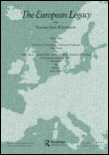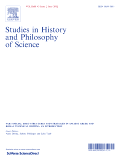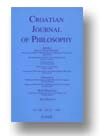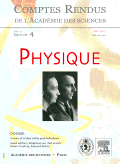
European Physical Journal H
metrics 2024
Unveiling the Evolution of Physics Through Scholarly Discourse
Introduction
The European Physical Journal H (EPJ H) is a distinguished peer-reviewed academic journal dedicated to the history and philosophy of physics, published by SPRINGER HEIDELBERG in Germany. With an ISSN of 2102-6459 and an E-ISSN of 2102-6467, the journal aims to bridge the gap between historical context and contemporary scientific advancements in the field of Physics and Astronomy. Although it holds a Q4 quartile ranking in the 2023 category for Physics and Astronomy (miscellaneous) and occupies the 161st position out of 243 in Scopus rankings, EPJ H has a vital role in facilitating discourse among researchers and educators interested in retracing the evolution of concepts and discoveries within physics. Emphasizing the importance of interdisciplinary dialogue, the journal provides open access options to ensure that its scholarly contributions are readily available to a global audience, thereby enhancing educational resources and research visibility. The timeline of publication spans from 2010 to 2024, making it an up-to-date resource for those exploring the intricate historical landscape of physical sciences.
Metrics 2024
 0.20
0.20 0.80
0.80 0.90
0.90 24
24Metrics History
Rank 2024
Scopus
IF (Web Of Science)
JCI (Web Of Science)
Quartile History
Similar Journals

Bollettino di Storia delle Scienze Matematiche
Illuminating the Evolution of Mathematical ThoughtBollettino di Storia delle Scienze Matematiche, published by FABRIZIO SERRA EDITORE, stands as a vital platform for the exploration of the rich history and philosophical underpinnings of mathematical sciences. With its origins tracing back to 2003, this journal primarily serves as an interdisciplinary forum where historians, philosophers, and mathematicians converge, reflecting the complex interplay between mathematics and its historical context. Although classified within the Q4 quartile for both the History and Philosophy of Science and Mathematics categories in 2023, the journal continues to stimulate critical discourse and encourage new avenues of research that challenge traditional narratives. While it is not an open-access publication, it is recognized for its scholarly rigor and contributes essential insights to the academic community, particularly those engaged in the nuanced study of mathematical practices through time. Researchers, professionals, and students alike will find valuable resources within its pages to inform their inquiries and broaden their understanding of the historical trajectory of mathematical thought.

European Legacy-Toward New Paradigms
Redefining Heritage: Insights for Today’s ScholarsEuropean Legacy-Toward New Paradigms is a distinguished academic journal published by Routledge Journals, Taylor & Francis Ltd, focusing on interdisciplinary approaches to cultural studies, history, and philosophy. With an ISSN of 1084-8770 and an E-ISSN of 1470-1316, this journal has made significant contributions to the understanding of European heritage and its impact on contemporary thought and society since its inception in 2001. It currently holds a Q3 ranking in Cultural Studies, History, and Philosophy, reflecting its relevance and scholarly impact within the academic community. Although not an Open Access journal, European Legacy provides valuable insights and research findings through its carefully curated articles, making it an essential resource for researchers, professionals, and students alike. The journal's commitment to exploring new paradigms fosters critical dialogue and encourages innovative perspectives on Europe’s complex legacies, thereby positioning itself as a vital platform for ongoing academic discourse.

STUDIES IN HISTORY AND PHILOSOPHY OF SCIENCE
Illuminating the Historical Contexts that Shape ScienceSTUDIES IN HISTORY AND PHILOSOPHY OF SCIENCE, published by Elsevier Science Ltd, is a leading academic journal dedicated to the exploration of historical and philosophical dimensions of science. With both an ISSN of 0039-3681 and E-ISSN of 1879-2510, this esteemed journal has established itself as a pivotal resource since its inception in 1970 and continues to publish cutting-edge research reflecting the evolution of scientific thought. Situated in the United Kingdom, it is recognized for its high-impact contributions, boasting a Q1 ranking in both History and History and Philosophy of Science categories as of 2023. Researchers in the humanities will benefit from the journal’s rigorous analysis and insightful discussions, as evidenced by its competitive Scopus rankings—placing it in the 96th and 83rd percentiles in their respective fields. Although not an open-access journal, it maintains a commitment to scholarly excellence, aiming to foster a deeper understanding of the interconnections between historical context and philosophical inquiry in the scientific domain, making it an invaluable resource for students, professionals, and researchers alike.

PHYSICS IN PERSPECTIVE
Integrating History and Modernity in Physical SciencesPHYSICS IN PERSPECTIVE, published by SPRINGER BASEL AG, is an esteemed journal dedicated to the intricate interplay between the history of physics and its contemporary implications. With an ISSN of 1422-6944 and an E-ISSN of 1422-6960, this journal has established itself as a pivotal resource for researchers, scholars, and students who seek a deeper understanding of physics through a historical lens. The journal enjoys a Q1 ranking in History and a Q3 ranking in Physics and Astronomy (miscellaneous), illustrating its significance in the arts and humanities as well as its notable contributions to physics scholarship. Published in Switzerland, it provides a unique platform for interdisciplinary dialogue, combining historical analysis with modern physics discussions. As it continues to grow through its converged years from 1999 to 2024, PHYSICS IN PERSPECTIVE remains committed to enriching the academic community and fostering innovative research that bridges the past and present of the physical sciences.

Croatian Journal of Philosophy
Advancing the Frontiers of Philosophical ThoughtCroatian Journal of Philosophy is a distinguished academic platform dedicated to the advancement of philosophical discourse, published by KRUZAK D O O. With an ISSN of 1333-1108 and an E-ISSN of 1847-6139, this journal has been a key player in the field since its inception in 2008, continuing to progress through its converged years until 2024. Recognized for its scholarly contributions, it holds a prestigious placement in Q3 within the philosophy category for 2023 and ranks #571 out of 806 in Scopus, reflecting its engagement with a broad spectrum of scholarly discussions and ideas. Though it operates without an Open Access model, the journal remains a vital resource for researchers, professionals, and students who are keen to explore contemporary and traditional philosophical issues from diverse perspectives. The journal's commitment to expanding the boundaries of philosophical inquiry emphasizes the significance of interdisciplinary dialogue, making it a reputable choice for those seeking to deepen their understanding of philosophical thought.

Recent Contributions to Physics
Bridging disciplines with cutting-edge physics research.Recent Contributions to Physics is a distinguished journal published by AL-FARABI KAZAKH NATIONAL UNIVERSITY, focusing on the latest developments and research breakthroughs in the field of physics. Established as an open access journal since 2008, it aims to facilitate the wide dissemination of knowledge by allowing researchers, professionals, and students worldwide to access high-quality content without barrier. Featuring a diverse range of topics within physics, from theoretical innovations to practical applications, this journal is an essential resource for anyone seeking to stay at the forefront of scientific advancement. Its commitment to quality and accessibility not only enhances the impact of research in the scientific community but also promotes collaboration across disciplines. With its dedication to fostering a vibrant academic dialogue, Recent Contributions to Physics is poised as a key contributor to the future of physics research.

Journal of Management History
Advancing Understanding Through Historical PerspectivesJournal of Management History, published by Emerald Group Publishing Ltd, stands as a beacon of scholarly discourse at the intersection of management and historical inquiry. With an ISSN of 1751-1348 and an E-ISSN of 1758-7751, this esteemed journal provides a critical platform for researchers and professionals to explore the impacts of historical trends on contemporary management practices. Notably, it holds a commendable Q2 ranking in Business, Management and Accounting and Q1 rankings in both History and History and Philosophy of Science for 2023, showcasing its prominent position within these fields. With its extensive coverage from 2006 to 2024, the Journal of Management History offers invaluable insights, fostering scholarly dialogue and contributing to significant advancements in management theory and practice. Although it operates under a traditional subscription model, it maintains a commitment to excellence in research, evidenced by its impressive Scopus rankings, which feature a percentile ranking of 98th within Arts and Humanities – History. Researchers, professionals, and students alike will find this journal essential for understanding the implications of historical narratives in shaping modern management paradigms.

European Journal for Philosophy of Science
Pioneering Critical Discussions in the Philosophy of ScienceThe European Journal for Philosophy of Science, published by SPRINGER, stands as a prestigious platform for scholars in the realms of philosophy and history of science. With an impressive impact factor and categorized in the Q1 Quartile for both History and Philosophy of Science and Philosophy, this journal ranks among the top 10% of its peers, reinforcing its critical role in advancing academic discussions and insights within these fields. With its composition of rigorous peer-reviewed articles and a commitment to fostering interdisciplinary dialogue, the journal navigates foundational and contemporary issues that shape scientific inquiry. Although currently not Open Access, it provides invaluable access to researchers, professionals, and students who seek to deepen their understanding of the philosophical underpinnings of scientific practice. Housed in the Netherlands, the journal continuously engages with the evolving landscape of philosophy in the scientific domain, making it a key resource for anyone invested in the intersection of science and philosophy.

COMPTES RENDUS PHYSIQUE
Exploring the Universe through Rigorous ResearchCOMPTES RENDUS PHYSIQUE, published by the esteemed Académie des Sciences, is a prestigious open access journal dedicated to the advancement of knowledge in the field of Physics and Astronomy. Since its inception, it has established a significant presence in the academic community, achieving an impressive Q2 ranking for the year 2023 in its category and holding a respectable 116th place within the Scopus rankings for General Physics and Astronomy. COMPTES RENDUS PHYSIQUE not only serves as a platform for high-quality research articles, reviews, and discussions but also strives to facilitate the dissemination of crucial scientific findings to a global audience, reflecting its commitment to open access since 2020. Based in Paris, France, the journal aims to bridge the gap between theoretical research and practical applications, supporting researchers, professionals, and students who seek to stay at the forefront of technological and scientific innovation. With its comprehensive coverage from 2002 to 2024, COMPTES RENDUS PHYSIQUE remains a vital resource for anyone engaged in the ever-evolving landscape of physics.

European Physical Journal Plus
Advancing Interdisciplinary Research for a Brighter TomorrowThe European Physical Journal Plus, published by Springer Heidelberg, is a reputable open-access journal that serves as a vital platform for innovative research across various disciplines, including physics, astronomy, and chemical engineering. With an impressive impact factor reflected by its Q2 ranking in both Fluid Flow and Transfer Processes and Physics and Astronomy (Miscellaneous) categories, this journal plays a crucial role in disseminating high-quality research findings. Since its inception in 2011, it has fostered interdisciplinary collaboration and encourages the exploration of fundamental principles and applications. The journal also boasts a respectable Scopus rank, indicating its solid influence and reach within the scientific community. Researchers, professionals, and students alike will find the journal to be an essential resource for staying abreast of advancements and trends in these dynamic fields, while its open-access model ensures that valuable insights are accessible to a broader audience.